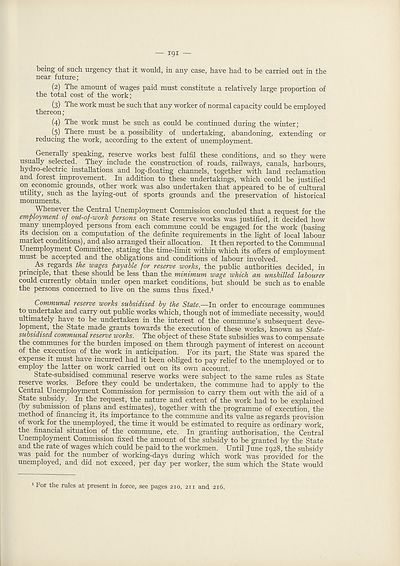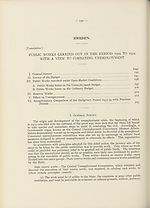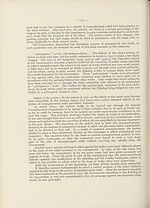Download files
Complete book:
Individual page:
Thumbnail gallery: Grid view | List view

being of such urgency that it would, in any case, have had to be carried out in the
near future;
(2) The amount of wages paid must constitute a relatively large proportion of
the total cost of the work;
(3) The work must be such that any worker of normal capacity could be employed
thereon ;
(4) The work must be such as could be continued during the winter;
(5) There must be a possibility of undertaking, abandoning, extending or
reducing the work, according to the extent of unemployment.
Generally speaking, reserve works best fulfil these conditions, and so they were
usually selected. They include the construction of roads, railways, canals, harbours,
hydro-electric installations and log-floating channels, together with land reclamation
and forest improvement. In addition to these undertakings, which could be justified
on economic grounds, other work was also undertaken that appeared to be of cultural
utility, such as the laying-out of sports grounds and the preservation of historical
monuments.
Whenever the Central Unemployment Commission concluded that a request for the
employment of out-of-work persons on State reserve works was justified, it decided how
many unemployed persons from each commune could be engaged for the work (basing
its decision on a computation of the definite requirements in the light of local labour
market conditions), and also arranged their allocation. It then reported to the Communal
Unemployment Committee, stating the time-limit within which its offers of employment
must be accepted and the obligations and conditions of labour involved.
. 4s re§ar(is the wages payable for reserve works, the public authorities decided, in
principle, that these should be less than the minimum wage which an unskilled labourer
could currently obtain under open market conditions, but should be such as to enable
the persons concerned to live on the sums thus fixed.1
Communal reserve works subsidised by the State.—In order to encourage communes
to undertake and carry out public works which, though not of immediate necessity, would
ultimately have to be undertaken in the interest of the commune’s subsequent deve¬
lopment, the State made grants towards the execution of these works, known as State-
subsidised communal reserve works. The object of these State subsidies was to compensate
the communes for the burden imposed on them through payment of interest on account
of the execution of the work in anticipation. For its part, the State was spared the
expense it must have incurred had it been obliged to pay relief to the unemployed or to
employ the latter on work carried out on its own account.
State-subsidised communal reserve works were subject to the same rules as State
reserve works. Before they could be undertaken, the commune had to apply to the
Central Unemployment Commission for permission to carry them out with the aid of a
State subsidy. In the request, the nature and extent of the work had to be explained
(by submission of plans, and estimates), together with the programme of execution, the
method of financing it, its importance to the commune and its value as regards provision
of work for the unemployed, the time it would be estimated to require as ordinary work,
the financial situation of the commune, etc. In granting authorisation, the Central
Unemployment Commission fixed the amount of the subsidy to be granted by the State
and the rate of wages which could be paid to the workmen. Until June 1928, the subsidy
was paid for the number of working-days during which work was provided for the
unemployed, and did not exceed, per day per worker, the sum which the State would
1 For the rules at present in force, see pages 210, 211 and 216.
near future;
(2) The amount of wages paid must constitute a relatively large proportion of
the total cost of the work;
(3) The work must be such that any worker of normal capacity could be employed
thereon ;
(4) The work must be such as could be continued during the winter;
(5) There must be a possibility of undertaking, abandoning, extending or
reducing the work, according to the extent of unemployment.
Generally speaking, reserve works best fulfil these conditions, and so they were
usually selected. They include the construction of roads, railways, canals, harbours,
hydro-electric installations and log-floating channels, together with land reclamation
and forest improvement. In addition to these undertakings, which could be justified
on economic grounds, other work was also undertaken that appeared to be of cultural
utility, such as the laying-out of sports grounds and the preservation of historical
monuments.
Whenever the Central Unemployment Commission concluded that a request for the
employment of out-of-work persons on State reserve works was justified, it decided how
many unemployed persons from each commune could be engaged for the work (basing
its decision on a computation of the definite requirements in the light of local labour
market conditions), and also arranged their allocation. It then reported to the Communal
Unemployment Committee, stating the time-limit within which its offers of employment
must be accepted and the obligations and conditions of labour involved.
. 4s re§ar(is the wages payable for reserve works, the public authorities decided, in
principle, that these should be less than the minimum wage which an unskilled labourer
could currently obtain under open market conditions, but should be such as to enable
the persons concerned to live on the sums thus fixed.1
Communal reserve works subsidised by the State.—In order to encourage communes
to undertake and carry out public works which, though not of immediate necessity, would
ultimately have to be undertaken in the interest of the commune’s subsequent deve¬
lopment, the State made grants towards the execution of these works, known as State-
subsidised communal reserve works. The object of these State subsidies was to compensate
the communes for the burden imposed on them through payment of interest on account
of the execution of the work in anticipation. For its part, the State was spared the
expense it must have incurred had it been obliged to pay relief to the unemployed or to
employ the latter on work carried out on its own account.
State-subsidised communal reserve works were subject to the same rules as State
reserve works. Before they could be undertaken, the commune had to apply to the
Central Unemployment Commission for permission to carry them out with the aid of a
State subsidy. In the request, the nature and extent of the work had to be explained
(by submission of plans, and estimates), together with the programme of execution, the
method of financing it, its importance to the commune and its value as regards provision
of work for the unemployed, the time it would be estimated to require as ordinary work,
the financial situation of the commune, etc. In granting authorisation, the Central
Unemployment Commission fixed the amount of the subsidy to be granted by the State
and the rate of wages which could be paid to the workmen. Until June 1928, the subsidy
was paid for the number of working-days during which work was provided for the
unemployed, and did not exceed, per day per worker, the sum which the State would
1 For the rules at present in force, see pages 210, 211 and 216.
Set display mode to:
![]() Universal Viewer |
Universal Viewer | ![]() Mirador |
Large image | Transcription
Mirador |
Large image | Transcription
Images and transcriptions on this page, including medium image downloads, may be used under the Creative Commons Attribution 4.0 International Licence unless otherwise stated. ![]()
| League of Nations > Communications and transit > Enquiry on national public works > (193) |
|---|
| Permanent URL | https://digital.nls.uk/195000859 |
|---|
| Shelfmark | LN.VIII |
|---|
| Description | Over 1,200 documents from the non-political organs of the League of Nations that dealt with health, disarmament, economic and financial matters for the duration of the League (1919-1945). Also online are statistical bulletins, essential facts, and an overview of the League by the first Secretary General, Sir Eric Drummond. These items are part of the Official Publications collection at the National Library of Scotland. |
|---|---|
| Additional NLS resources: |
|

